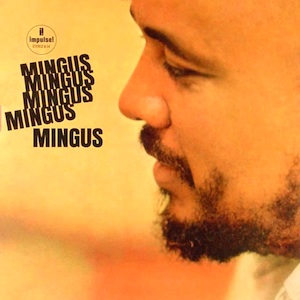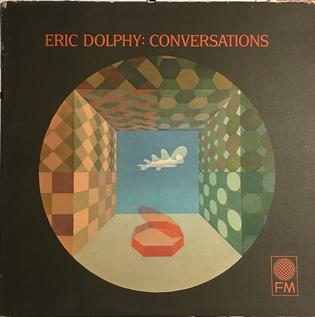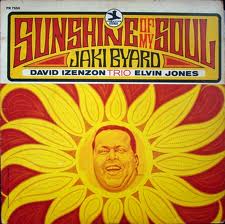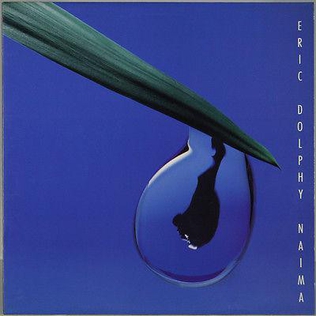
Eric Allan Dolphy Jr. was an American jazz alto saxophonist, bass clarinetist and flautist. On a few occasions, he also played the clarinet and piccolo. Dolphy was one of several multi-instrumentalists to gain prominence in the same era. His use of the bass clarinet helped to establish the instrument within jazz. Dolphy extended the vocabulary and boundaries of the alto saxophone, and was among the earliest significant jazz flute soloists.

John Arthur "Jaki" Byard was an American jazz multi-instrumentalist, composer, and arranger. Mainly a pianist, he also played tenor and alto saxophones, among several other instruments. He was known for his eclectic style, incorporating everything from ragtime and stride to free jazz.

Mingus Mingus Mingus Mingus Mingus is a studio album by the American jazz composer and bassist Charles Mingus which was released on January 9, 1964.

Outward Bound is the debut album by jazz multi-instrumentalist Eric Dolphy, released in 1960. It is oriented towards straight bebop, and slightly less adventurous than the majority of his later recordings. The album was recorded at Van Gelder Studio in New Jersey and features Dolphy in a quintet with trumpeter Freddie Hubbard, pianist Jaki Byard, bassist George Tucker and drummer Roy Haynes. Hubbard had shared living space with Dolphy when they both first arrived in New York City. The cover artwork was by Dolphy's friend Richard "Prophet" Jennings.

Iron Man is an album by American jazz multi-instrumentalist Eric Dolphy, recorded in 1963 and released by the Douglas International label in 1968. The album was reissued on disc two of Musical Prophet: The Expanded 1963 New York Studio Sessions, released in 2018 by Resonance Records.

Out There is a studio album by jazz musician and composer Eric Dolphy which was released through Prestige Records in September 1961. It features Dolphy in a quartet with bassists Ron Carter and George Duvivier, and drummer Roy Haynes. It was Dolphy's second solo album, released following his time with Charles Mingus.

Here and There is a jazz album by multi-instrumentalist Eric Dolphy. It was originally released in 1966 on the Prestige label as PRLP 7382. It contains tracks recorded on three separate dates, in different locations. Mal Waldron's "Status Seeking" and Dolphy's solo bass clarinet version of Billie Holiday's "God Bless the Child" were recorded on July 16, 1961 at the Five Spot in New York City as part of the concert that was documented on the At the Five Spot recordings. "April Fool" and "G.W. " were recorded on April 1, 1960 at Van Gelder Studio in Englewood Cliffs, New Jersey as part of the session that yielded Outward Bound, Dolphy's first album as a leader. "Don't Blame Me" was recorded on September 6, 1961 in Berlingske Has, Copenhagen, Denmark during Dolphy's second European tour, as part of the sessions that produced Eric Dolphy in Europe Volumes 1-3.

Conversations is a 1963 album by American jazz multi-instrumentalist, Eric Dolphy first released by the FM label and later reissued by Vee-Jay as The Eric Dolphy Memorial Album the following year. The album was reissued on disc one of Musical Prophet: The Expanded 1963 New York Studio Sessions, released in 2018 by Resonance Records.

Cornell 1964 is a live album by the Charles Mingus Sextet, featuring multi-instrumentalist Eric Dolphy. It was recorded at Cornell University in Ithaca, New York, on March 18, 1964.

The Great Concert of Charles Mingus is a live album by the jazz bassist and composer Charles Mingus, recorded at the Théâtre des Champs-Élysées, Paris, France, on April 19, 1964. It was originally released as a triple album in 1971 on the French America label. The album was recorded just two days after the live sessions that produced Revenge!, which was also recorded live in Paris.

Town Hall Concert is a 1964 live album by the jazz bassist and composer Charles Mingus. It was recorded in New York City at The Town Hall on April 4, 1964. "So Long Eric" is a 12-bar blues that got its name after Eric Dolphy informed Mingus he would be leaving the band to stay in Europe before a concert in Oslo. "Praying With Eric" is more commonly known as "Meditations On Integration". The album was originally released on Mingus' own Jazz Workshop label and subsequently rereleased on Fantasy as part of their Original Jazz Classics series.

Heavy!!! is an album by American jazz saxophonist Booker Ervin featuring performances recorded in 1966 for the Prestige label.

Sunshine of My Soul is an album by pianist Jaki Byard recorded in 1967 and released on the Prestige label.

Sixty-Eight is a jazz album by drummer Billy Hart, released on SteepleChase in 2011. The album marks Hart's 68th recording for Steeplechase, and his 68th year.
Lady Bird is an album by saxophonist Archie Shepp, recorded in 1978.
Charlie Mariano with His Jazz Group is a 10-inch album by alto saxophonist Charlie Mariano, recorded in 1950.

Naima is an album by American musician Eric Dolphy, released in Europe in 1987 by the Jazzway label, and later by the West Wind label. Four of the five tracks were recorded on June 11, 1964 in a Paris studio for radio broadcast, nine days after the Hilversum session that yielded Last Date, and eighteen days before Dolphy's death. The remaining track, a duet with bassist Ron Carter, was recorded in New York City in November 1960, during a session which also produced three of the tracks released on Other Aspects.

Dash One is an album by Eric Dolphy consisting of alternate takes of four pieces recorded for other albums.

Stockholm Sessions is an album by Eric Dolphy. It was recorded in September and November 1961 at the Swedish Broadcast station in Stockholm, Sweden, and was released by Inner City Records and Enja Records in 1981. The album was recorded during Dolphy's second visit to Europe.

Vintage Dolphy is a live album by multi-instrumentalist Eric Dolphy. Side A was recorded at Carnegie Hall in New York City on April 18, 1963, and features Dolphy in a quartet format with trumpeter Edward Armour, bassist Richard Davis, and drummer J. C. Moses. Side B contains three pieces by Gunther Schuller, with varying instrumentation, one of which was recorded at the Everson Museum of Art in Syracuse, New York with the Syracuse Friends of Chamber Music on March 10, 1962, the other two of which were recorded at Carnegie Hall on March 14, 1963. The remaining track is a rendition of Charlie Parker's "Donna Lee" by an all-star ensemble recorded at Carnegie Hall on April 18, 1963.


















